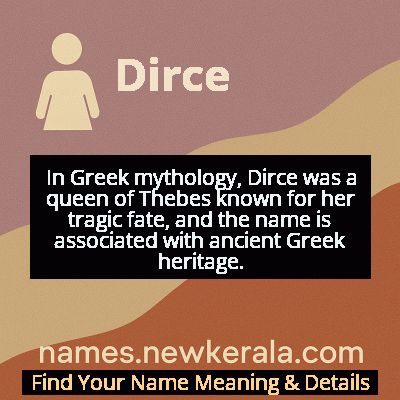Dirce Name Meaning & Details
Origin, Popularity, Numerology Analysis & Name Meaning of Dirce
Discover the origin, meaning, and cultural significance of the name DIRCE. Delve into its historical roots and explore the lasting impact it has had on communities and traditions.
Name
Dirce
Gender
Female
Origin
Greek
Lucky Number
3
Meaning of the Name - Dirce
In Greek mythology, Dirce was a queen of Thebes known for her tragic fate, and the name is associated with ancient Greek heritage.
Dirce - Complete Numerology Analysis
Your Numerology Number
Based on Pythagorean Numerology System
Ruling Planet
Jupiter
Positive Nature
Optimistic, inspirational, and creative.
Negative Traits
Scattered, exaggerating.
Lucky Colours
Yellow, gold, purple.
Lucky Days
Thursday.
Lucky Stones
Yellow sapphire.
Harmony Numbers
1, 2, 9.
Best Suited Professions
Arts, writing, communication.
What People Like About You
Creativity, optimism.
Famous People Named Dirce
Dirce
Mythological Queen
Central figure in Theban mythology known for her dramatic punishment
Dirce Kowalski
Actress
Influential Brazilian performer in theater and television
Dirce Funari
Actress
Prominent Italian film and stage actress of mid-20th century
Dirce Navas
Writer
Noted Portuguese poet and literary translator
Name Variations & International Equivalents
Click on blue names to explore their detailed meanings. Gray names with will be available soon.
Cultural & Historical Significance
The cultural impact of Dirce's story extended far beyond ancient Greece. During the Renaissance, her myth experienced a revival as classical texts were rediscovered, inspiring numerous artworks that explored the dramatic potential of her punishment. The Farnese Bull, a massive marble sculpture from the 3rd century BCE rediscovered in the 16th century, became one of the most celebrated classical artworks precisely because it captured the high drama of Dirce's fate. This cultural legacy demonstrates how a negative mythological figure can nevertheless inspire centuries of artistic creation and philosophical reflection on justice, power, and human nature.
Extended Personality Analysis
The name Dirce carries complex psychological associations derived from its mythological roots. Individuals with this name often develop a strong awareness of their name's dramatic history, which can shape their personality in several ways. Many display a heightened sense of justice and fairness, perhaps as a subconscious response to the negative actions of their namesake. They tend to be perceptive about power dynamics in relationships and may exhibit protective instincts toward vulnerable individuals.
Modern psychological interpretation suggests that bearing a name with such strong mythological baggage can foster emotional depth and resilience. Dirce-named individuals often demonstrate remarkable capacity for personal transformation, turning potential negative associations into sources of strength. They may possess natural dramatic flair and excel in creative fields where emotional complexity is valued. The name's rarity contributes to a sense of individuality and uniqueness, often resulting in confident, self-aware personalities who understand the power of narrative and redemption in human experience. These traits make Dirce-bearers often memorable and impactful in their personal and professional relationships.
Modern Usage & Popularity
In contemporary naming practices, Dirce remains an exceptionally rare choice, typically selected by parents with specific cultural, literary, or historical interests. Its usage is most prominent in Portuguese-speaking countries, particularly Brazil, where it maintains a modest but consistent presence. The name's popularity peaked in Brazil during the mid-20th century and has since declined, though it continues to be used by families seeking distinctive classical names. Modern parents who choose Dirce often appreciate its melodic sound and rich mythological background, viewing the negative associations as part of a complex narrative rather than a deterrent. The name appears occasionally in artistic and intellectual circles, where its classical heritage and dramatic connotations are valued. Current naming trends show increasing interest in mythological names, which may lead to a gradual revival of Dirce among parents seeking unique names with deep historical roots and strong character associations.
Symbolic & Spiritual Meanings
Symbolically, Dirce represents the eternal cycle of action and consequence, serving as a powerful metaphor for cosmic justice and personal transformation. The bull that drags her to death symbolizes untamed natural forces and the inevitable enforcement of moral law, making the name emblematic of humanity's relationship with higher powers and natural order. In psychological terms, Dirce symbolizes the shadow self – the dark aspects of personality that must be confronted and integrated for wholeness.
The name has evolved in modern symbolic interpretation to represent resilience and the capacity for redemption. Where ancient audiences saw primarily a cautionary tale about hubris, contemporary interpreters often find meaning in the transformative potential of suffering and the possibility of moral growth through dramatic experience. Dirce symbolizes the complex truth that even negative archetypes can inspire positive change and deeper understanding of human nature. This evolving symbolism makes the name particularly resonant in therapeutic and literary contexts, where it represents the journey toward self-awareness and the integration of light and shadow aspects of personality.

